Paranjoy Guha Thakurta in New Delhi
In this season of controversies, a new one is brewing with the largest stakeholder in the UTI (Unit Trust of India) Asset Management Company threatening to pull out alleging that the Union ministry of finance is thrusting its own candidate as the chairman and managing director of the company which runs India's fourth largest mutual fund.
Political circles in New Delhi and the financial world in Mumbai are abuzz with speculation about the real reason why the powers-that-be are reportedly backing the candidature of Jitesh Khosla, a 1976 Assam cadre officer of the Indian Administrative Service to take over the reins of UTI AMC -- once India's largest mutual funds organisation which today manages assets worth Rs 67,189 crore (Rs 671.89 billion).
Khosla's nomination assumes significance since he is the brother of Omita Paul, adviser to Union Finance Minister Pranab Mukherjee. Paul, who used to belong to the Central Information Service (later Indian Information Service), has worked as Mukherjee's confidante and adviser for decades, including his recent stints at the helm of the ministries of defence and external affairs.
It recently transpired that the American firm T Rowe Price (TRP), which acquired a 26 per cent stake in UTI AMC, has resented the interference from the finance ministry which has been pushing for Khosla, whose candidature had earlier been rejected by the consulting firm that had been engaged to find a successor to U K Sinha, former CMD of UTI AMC who took over as head of the Securities and Exchange Board of India in February this year.
Breaking the story on Saturday, April 9, the Financial Express had commented that if the finance ministry remained resolute on its own choice, this could lead to a boardroom battle.
. . .
Controversy brews over who will head UTI AMC
Photographs: Reuters
But when The Economic Times on Thursday, April 15, approached TRP spokesperson Sarah Cadden, to comment on reports that the American company was contemplating an exit from UTI AMC if the CMD's appointment was not done taking after considering the views of major shareholders, she stated: "We have no comment and refer you to UTI and Anita Ramachandran (acting chairperson of the board of directors of UTI AMC)."
Ramachandran did not, however, respond to ET's queries. The finance ministry too has so far not reacted to reports that it was allegedly pushing for Khosla's appointment.
Some members of the board of directors of UTI AMC are said to have made their reservations known to North Block.
In January 2010, the Baltimore-based TRP had acquired a strategic stake in UTI by buying 6.5 per cent from the four existing sponsors of the company, namely, Punjab National Bank, State Bank of India, Bank of Baroda, and Life Insurance Corporation of India.
The four sponsoring organisations now hold 18.5 per cent equity each in UTI AMC.
. . .
Controversy brews over who will head UTI AMC
Image: (Inset) U K Sinha, Sebi chairman.Photographs: Reuters
Even though TRP is the biggest shareholder of UTI AMC, the fact that the other four are government-controlled financial institutions enables the ministry of finance to indirectly control the asset management company.
While speculation is rife as to whether the ministry wants to control UTI AMC by proxy, there is also a view that by appointing Khosla the finance ministry would be accused of nepotism.
While it is not clear how strongly TRP would register its protest against attempts to appoint Khosla as the executive head of UTI AMC, the beleaguered Manmohan Singh government can ill-afford another scandal.
When a search was launched to look for U K Sinha's successor, the company had decided to abide by global best practices. A three-member panel entrusted this task to manpower consultants, Egon Zehnder International.
Egon had earlier been engaged to find a head for Axis Bank, which is owned by the UTI.
. . .
Controversy brews over who will head UTI AMC
Photographs: Dominic Xavier/Rediff.com
Egon interviewed close to 30 candidates, among them, Khosla. His claim for the top job in UTI AMC was reportedly rejected since other candidates had experience that was considered more relevant.
Khosla is currently officer on special duty at the Indian Institute of Corporate Affairs. As joint secretary in the Union ministry of corporate affairs, he had overseen the government's intervention in the Satyam scandal.
Incidentally, when Sinha had steered the initiative to enable TRP to acquire a stake in UTI AMC, he had been backed by a group of influential bureaucrats in the finance ministry (some of whom are said to be close to former finance minister P Chidambaram) to go ahead with the 'strategic tie-up' with TRP.
However, many in North Block as well as in UTI were extremely unhappy at the manner in which the deal was struck and pushed through.
The detractors of the deal contended that UTI AMC could have obtained more for 26 per cent of its shares if it had hawked the same through a transparent and openly competitive system, say, through a public auction.
. . .
Controversy brews over who will head UTI AMC
Photographs: Dominic Xavier/Rediff.com
For more than two decades after UTI started operating in 1964, the mutual fund schemes it offered used to be virtually the only financial vehicles using which small investors could invest their savings in the stock market.
When it was formed, the biggest shareholder was the government-owned Industrial Development Bank of India.
More than twenty other smaller government-controlled entities also become 'promoters' of the UTI. No money, however, was directly provided by the Indian government.
The funds came indirectly through purchase of equity shares by government-controlled or public sector organisations.
UTI continued to work as the country's largest mutual funds organisation channelling large amounts of money belonging to hundreds of thousands of small investors into stock exchanges.
. . .
Controversy brews over who will head UTI AMC
Image: M Damodaran, former UTI chief and ex-Sebi chief.Photographs: Reuters
But in the early-1990s after the stock markets collapsed in the wake of the scam masterminded by Harshad Mehta, cracks began appearing in the monolithic UTI.
The government intervened with infusion of funds to ensure that the Trust was able to fulfil its assurances to investors. Slowly the organisation started crumbling under the weight of its guaranteed returns schemes.
After the controversial 2001 freeze on transactions in Unit Scheme of 1964 (US 64), the government appointed M Damodaran -- an IAS officer of the Tripura cadre who had worked briefly with the Reserve Bank of India -- to restructure UTI that had collapsed under the burden of trying to meet the requirements of assured returns schemes and was having to be bailed out by infusion of government funds time and again.
Subsequently the government divested its ownership for a sum of Rs 1,250 crore (Rs 12.50 billion) in favour of four 'sponsoring' public sector banks and financial institutions -- SBI, LIC, PNB and BoB -- each of whom held 25 per cent stake in UTI AMC.
. . .
Controversy brews over who will head UTI AMC
Photographs: Uttam Ghosh/Rediff.com
On November 9, 2009, it was announced that T Rowe Price Global Investment Services Ltd, had agreed to buy a 26 per cent stake in UTI AMC Pvt Ltd and UTI Trustee Co Pvt Ltd for around Rs 650 crore (Rs 6.50 billion) or $138 million (at prevailing exchange rates) that worked out to roughly 3.25 per cent of the total assets under management of UTI AMC.
At the end of December 2009, the total AUM of UTI AMC stood at approximately Rs 78,200 crore (Rs 782 billion). At the price paid by TRP, UTI AMC would be valued at around Rs 2,500 crore (Rs 25 billion). The sale to TRP was formally concluded on January 20, 2010.
T Rowe Price, which was managing assets worth around $367 billion in September, picked up an equity stake of 6.5 per cent from each of the four equal shareholders of UTI AMC, that is, SBI, LIB, PNB and BoB.
After the sale, each of these four shareholders are left with a 18.5 per cent stake in UTI AMC, lower than the 25 per cent shareholding of TRP.
The US firm went to get one-fourth representation on the board of directors of UTI AMC. Two representatives of TRP -- James S Riepe and Fleming Madsen -- were inducted to the board.
. . .
Controversy brews over who will head UTI AMC
Photographs: Rediff Archive
Incidentally, Sinha, a 1976 batch IAS officer from the Bihar cadre, retired from government service four years ahead of his retirement age, as the government did not agree to let him continue as head of UTI AMC beyond May 2008 while continuing to remain in the IAS.
The Prime Minister's Office was said to be against granting him an extension of service despite recommendations made by Cabinet Secretary K M Chandrashekhar and the then finance minister P Chidambaram.
At one stage, he was reportedly in the race to head market regulator Sebi but lost out to C B Bhave.
The institutions sponsoring UTI AMC were persuaded to let Sinha continue to head the organisation after May 2008.
After Bhave's departure, Sinha did eventually become the head of Sebi in February this year.

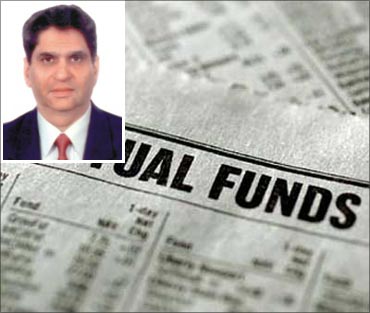

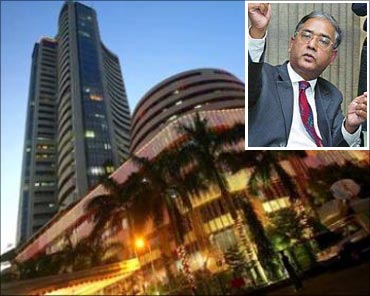
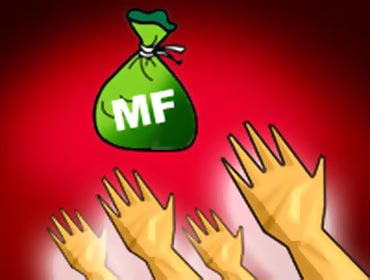

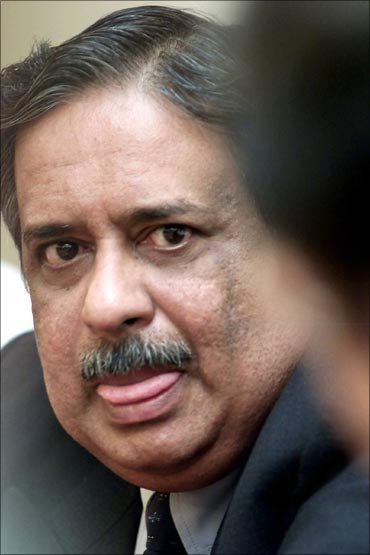
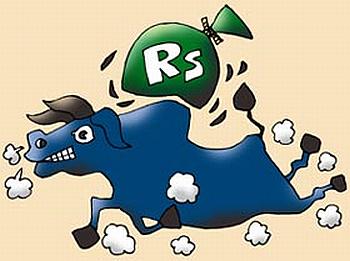
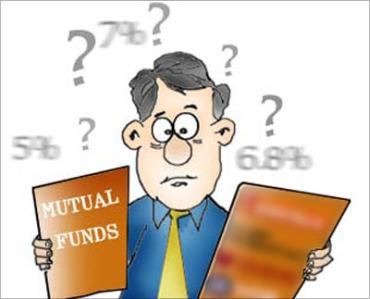
article